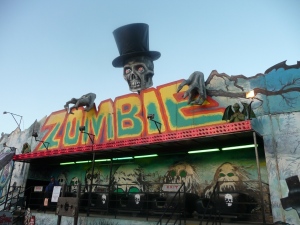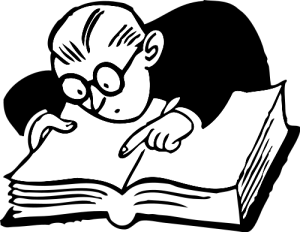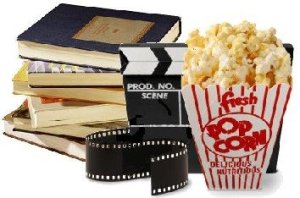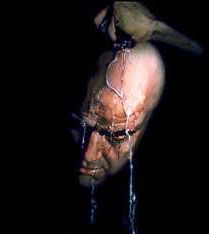 As anyone connected to the horror genre can tell you, we get more than our fair share of questions that boil down to “why do you read/write that stuff?” along with the accompanying nervous sidelong looks and wrinkled nose gestures. And, put on the spot, I’ve always found it difficult to give a reasoned answer, settling for either the glib (“because I’m more twisted than a yoga mom wrestling with a Slinky in a pretzel machine”) or the cop-out (a bewildered shrug). So when Sue Palmer from Book Junkies did me the recent kindness of asking me a far more nuanced and generously-phrased version of that question, I snapped her hand off and wrote down some thoughts. Only, I didn’t actually snap her hand off. That’s a metaphor, thankfully. Here are those thoughts, and I think they come closest to capturing what it is about the genre that attracts me, repels me, keeps me coming back as a reader, writer and even viewer. Well, all this and the euphoric thrill of the carnival ride, too; let’s not forget that. Continue reading “Catharsis or Carnival?”
As anyone connected to the horror genre can tell you, we get more than our fair share of questions that boil down to “why do you read/write that stuff?” along with the accompanying nervous sidelong looks and wrinkled nose gestures. And, put on the spot, I’ve always found it difficult to give a reasoned answer, settling for either the glib (“because I’m more twisted than a yoga mom wrestling with a Slinky in a pretzel machine”) or the cop-out (a bewildered shrug). So when Sue Palmer from Book Junkies did me the recent kindness of asking me a far more nuanced and generously-phrased version of that question, I snapped her hand off and wrote down some thoughts. Only, I didn’t actually snap her hand off. That’s a metaphor, thankfully. Here are those thoughts, and I think they come closest to capturing what it is about the genre that attracts me, repels me, keeps me coming back as a reader, writer and even viewer. Well, all this and the euphoric thrill of the carnival ride, too; let’s not forget that. Continue reading “Catharsis or Carnival?”
Tag: stephen king
Best Resources For Fiction Writers
 Search the Internet, and you’ll find hundreds of books and websites about how to write and sell fiction. I’ve scanned many over the years, but there are very few I go back to again and again. Here’s a cross section of what I’ve found to be among the best. As usual, your actual experience may vary.
Search the Internet, and you’ll find hundreds of books and websites about how to write and sell fiction. I’ve scanned many over the years, but there are very few I go back to again and again. Here’s a cross section of what I’ve found to be among the best. As usual, your actual experience may vary.
1. The Art of Fiction by John Gardner
Meant for beginning writers, The Art of Fiction contains insights even experienced authors may find helpful. Among other valuable tidbits, Gardner offers good insight into plot structure and fictional time versus real time. Although it was written some thirty years ago, the advice is still current.
Continue reading “Best Resources For Fiction Writers”
The Book Was Better
 “I just saw the movie, wasn’t a patch on the book.”
“I just saw the movie, wasn’t a patch on the book.”
If I’d stuffed my face with a deep-fried Mars bar every time I heard this sentiment, I’d probably lose a weigh-in with an elephant seal, have a mouthful of teeth with the average consistency of a sea sponge, and skin the overall texture of pepperoni by now. I’ll bet every last one of us has said something similar, though. Which makes every last one of us a bit weird, really. Not quite stupid, but getting there, you know?
Let me explain my thinking. (I find I have to do that a lot, which says nothing good about me whatsoever.)
It’s actually quite simple. A book is a book. A movie is a movie. And Popeye is what he is… an extremely odd-shaped sailor with a fetish for canned green vegetables.
Seriously, though, “the book was better” has become one of those irksome knee-jerk phrases that are stand-ins for something else entirely. See: “it’s political correctness gone mad!” which actually means “damn, the world doesn’t condone my bigotry any more, so I’ll just have this here tantrum instead”. Or: “I knew them before they were famous” which translates as “I am an unctuous hipster and will drip oily, corrosive scorn on, you know, like, everyone not in the inner circle of me, dude.” Continue reading “The Book Was Better”
The Horror… The Horror…
“Horror… Horror has a face… and you must make a friend of horror.” Colonel Kurtz, Apocalypse Now
 You’d think that horror would be one of the easiest of genres within which to write: create a protagonist who is either extremely likeable or go for the opposite, a character deserving of some particularly overdue and nasty payback; either invent or import a monster from Familiar Horror Trope Land (sparkly or not, preferably the latter); bring them together in some unexpected location and everything gets all squishy and liquidized and unpleasant and the audience members lose all control of their bodily functions and curse your parents… except that’s not necessarily what happens at all. Horror is hard to write. Okay, no, I just lied. Horror is easy to write, but good horror is hard to write. Continue reading “The Horror… The Horror…”
You’d think that horror would be one of the easiest of genres within which to write: create a protagonist who is either extremely likeable or go for the opposite, a character deserving of some particularly overdue and nasty payback; either invent or import a monster from Familiar Horror Trope Land (sparkly or not, preferably the latter); bring them together in some unexpected location and everything gets all squishy and liquidized and unpleasant and the audience members lose all control of their bodily functions and curse your parents… except that’s not necessarily what happens at all. Horror is hard to write. Okay, no, I just lied. Horror is easy to write, but good horror is hard to write. Continue reading “The Horror… The Horror…”
